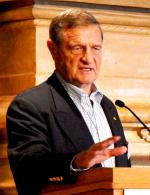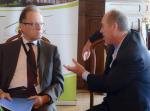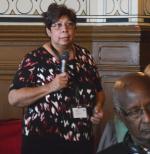 Former Governor of WA and Chief of Army Staff, Lt Gen John Sanderson, didn’t limit his scope when speaking at the IofC conferences in Switzerland in July. His three day workshop embraced a mega-topic: ‘Meeting global challenges – the role of belief systems’. He argued we have to create ‘boats of trust to ride the whirlpool’ during ‘a period of great global change’.
Former Governor of WA and Chief of Army Staff, Lt Gen John Sanderson, didn’t limit his scope when speaking at the IofC conferences in Switzerland in July. His three day workshop embraced a mega-topic: ‘Meeting global challenges – the role of belief systems’. He argued we have to create ‘boats of trust to ride the whirlpool’ during ‘a period of great global change’.
Sanderson was one of the 26 Australians participating or providing support at the annual conferences which take place at the international conference centre at Caux, Switzerland.
Australians facing global challenges in Caux
After more than a decade in Vietnam during the war, and then in Cambodia as commander of the 16,000-strong UN peace-keeping force, Lt Gen John Sanderson knows what it is to face tough situations. Having served five years as Governor of WA, Sanderson was then commissioned to report on Aboriginal disadvantage in WA. His report proved too tough for the Government to accept.
Last month, at the Initiatives of Change (IofC) conferences in Switzerland, Sanderson didn’t limit his scope, leading a three day workshop on “Meeting global challenges – the role of belief systems”. Faced by vast inequalities (where the world’s richest 83 individuals have as much wealth as half of the globe’s entire population), contending with angry terrorists and the irresistible market forces, Sanderson said no-one should doubt that we are “in a period of great global change”. Holding to the premise that “we are not alone in time and space; God wants us to succeed and has already forgiven us”, Sanderson led participants through what it will take to create “boats of trust… to ride the whirlpool”. He sees service and leadership through civil society as key to taming “the great paradigm shift that is upon us”.
Sanderson was one of the 26 Australians participating or providing support at the annual conferences in Caux, Switzerland. He contributed to a week of dialogue on “Just Governance for Human Security” which brought together 200 people from 32 countries.
 Another Australian participant tackling global concerns was Steve Killelea from Sydney, who has developed one of Australia’s largest private overseas aid organisations, reaching the poorest of the poor in many countries. He founded the Global Peace Index, which examines the conditions needed to achieve peace. “We face challenges such as decreasing biodiversity and the use of the planet’s fresh water,” he said. “Yet we are still running the world on a consumer-based capitalist system. We need a philosophy that incorporates all individuals in a global vision. Unlike any other epoch in human history, peace is a prerequisite for the survival of society as we know it.”
Another Australian participant tackling global concerns was Steve Killelea from Sydney, who has developed one of Australia’s largest private overseas aid organisations, reaching the poorest of the poor in many countries. He founded the Global Peace Index, which examines the conditions needed to achieve peace. “We face challenges such as decreasing biodiversity and the use of the planet’s fresh water,” he said. “Yet we are still running the world on a consumer-based capitalist system. We need a philosophy that incorporates all individuals in a global vision. Unlike any other epoch in human history, peace is a prerequisite for the survival of society as we know it.”
The conference included people from many situations of tension and conflict – from Russia and Ukraine, from the Sahel region of Africa, from the Middle East. Tensions were immediately evident between the Ukrainians and the Russians. The wounds were too fresh for calm objective discussion. After several sleepless nights of debate, they managed to write a declaration which most were ready to sign, stating the common values and principles needed as they try to form “practical steps for peace-building and establishing good neighbourly relations”. See commentary by Ian Parsons, next page.
 Another participant was Dr Christine Fejo-King, chairperson of the National Coalition of Aboriginal and Torres Strait Islander Social Workers Association. “Caux opened my eyes,” she said later. “What was amazing was that everyone is struggling with the same issues in their own countries and sharing the answers they’ve found. My whole focus has been working with my people. We are not struggling on these issues on our own. We have progressed things here which we have to offer to other people.”
Another participant was Dr Christine Fejo-King, chairperson of the National Coalition of Aboriginal and Torres Strait Islander Social Workers Association. “Caux opened my eyes,” she said later. “What was amazing was that everyone is struggling with the same issues in their own countries and sharing the answers they’ve found. My whole focus has been working with my people. We are not struggling on these issues on our own. We have progressed things here which we have to offer to other people.”

